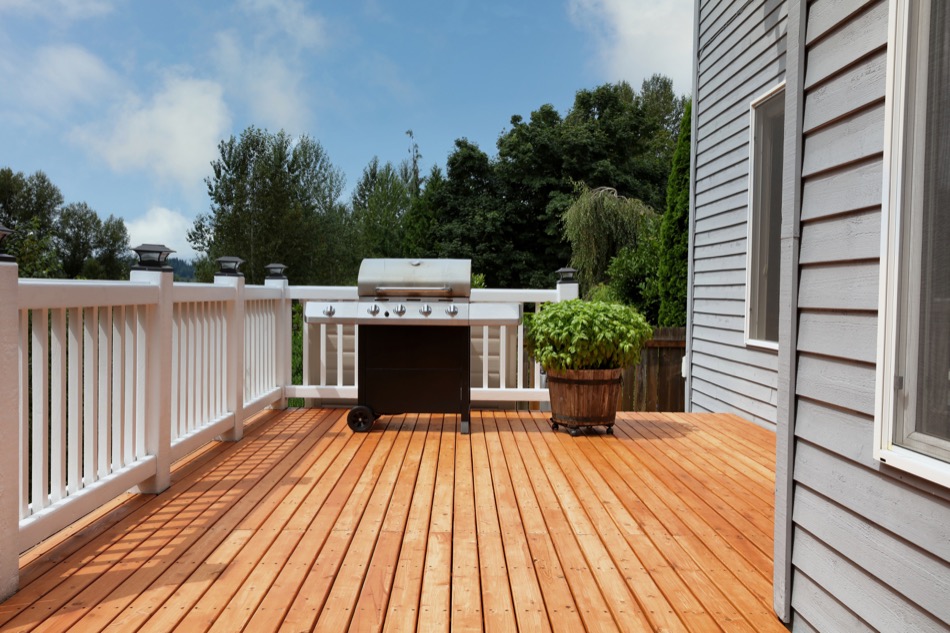Is Installing a Deck a Smart Home Improvement?
 Current homeownership trends show that people want to maximize the space in their homes. For many homeowners, this includes making a living space in their yard. Installing a deck is a common way to achieve this goal. Deck installation is a moderate investment, meaning people should be sure they are making a wise choice. Here’s how homeowners can determine if a deck is the right home improvement.
Current homeownership trends show that people want to maximize the space in their homes. For many homeowners, this includes making a living space in their yard. Installing a deck is a common way to achieve this goal. Deck installation is a moderate investment, meaning people should be sure they are making a wise choice. Here’s how homeowners can determine if a deck is the right home improvement.
1. Current Home Improvement Goals
A homeowner’s maintenance and improvement obligations tend to run in a cycle. If they own a property long enough, there is a high chance they will eventually repair or replace most elements of the structure. People must prioritize what they want for comfort and convenience and what they need for practical home use. Installing a deck tends to be a good choice for homeowners who desire:
- extra living space
- more opportunities to enjoy the outdoor portion of their property
- an update that changes the home’s curb appeal
With professional installation, deck installation usually takes a few days up to two weeks. Given the need to dig into the ground, scheduling this improvement during milder, dry weather is important. You may also need time to permit the deck and call your city’s underground survey line before the dig. The last thing you want is to impact critical utility lines!
2. Budget
Decks land somewhere in the middle of the spectrum of home improvement costs. They are not a huge investment, but homeowners may need to plan some months or a year to pay for it. The price to install a deck runs about $4,500- $12,000, according to HomeAdvisor estimates. The total expense is influenced by:
- deck size and location
- materials, such as wood, wood composite, or synthetic
- extra features, like built-in seating, a fire pit, or outdoor kitchen
- professional installation or a DIY project
Selecting premium upgrades, like exotic hardwoods, can give the deck a luxury look at a higher price. Homeowners who want to be able to use the deck year-round might consider adding something like a sunroom, although this significantly increases the cost.
3. Return On Investment
Because there are usually at least a few items on a homeowner’s improvement list, choosing one with a high return on investment is important. People need to pay attention to their home’s resale value, even if they are not planning to sell the property anytime soon. Selecting improvements like a new deck will increase the home’s value and make it easier to get the home to appeal to more buyers in the future.
An average deck has a typical return on investment (ROI) of 70-80%. The return may rise or fall depending on the deck’s total cost and its condition when you sell. Usually, paying more for a home improvement corresponds with a lower ROI for the upgrade because buyers have a specific idea of what they are willing to pay for certain amenities in a home. They may not be willing to pay more for expensive materials or added features unless it is considered necessary for the neighborhood.
4. Upkeep/Repair Obligations
The type of material used to build the deck affects how homeowners must maintain it. Many wood deck composites and synthetic materials are designed to be easy to clean and require no treatments to maintain color and condition. Solid wood options tend to look more authentic but demand periodic sanding, staining, or resealing.
Decks usually last 10-25 years, depending on the materials and upkeep. As a general rule, less-expensive options tend to break down more quickly. Some products are rated to last longer. This often presumes excellent care, moderate use, and mild weather.
A homeowner might choose to install a deck for many reasons, including for convenience and greater use of the property. Considering these factors, people can determine if now is the right time for deck installation.
Start Your Home Search
Preston Guyton
Share this Post
Related Articles
Real Estate Tips
How to Communicate Your Value As A Real Estate Agent
Real Estate Tips
10 Essential Steps to Hiring a Contractor
Real Estate Tips
Why Perfection Squashes Your Real Estate Businesses
Real Estate Tips





